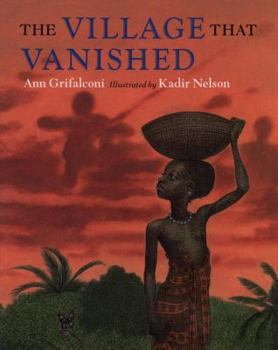The Village That Vanished
Select Format
Select Condition 
Book Overview
Young Abekenile and all the villagers of Yao feel safe sheltered deep within the jungle. But word has now come that slavers are on their way! Abekenile looks to the women of her tribe: her mother, who... This description may be from another edition of this product.
Format:Hardcover
Language:English
ISBN:0803726236
ISBN13:9780803726239
Release Date:September 2002
Publisher:Dial Books
Length:40 Pages
Weight:1.20 lbs.
Dimensions:0.5" x 9.2" x 11.9"
Age Range:10 years and up
Grade Range:Grade 5 and higher
Customer Reviews
3 ratings
Refreshing and Heartwarming
Published by Thriftbooks.com User , 17 years ago
I came across this book in the library. I read it to my 7 year old daughter and she and I both were delighted with this tale. As a fictional tale for children it embodies the spirit of community and culture the magic of nature and the ancestral-spiritual realm. The illustrations are beautiful which greatly embellishes the storytelling of the author. Well-written, beautifully illustrated and wonderful content. I highly recommend it.
Beautiful Illustrations and Story
Published by Thriftbooks.com User , 17 years ago
I got this book solely because of Kadir Nelson's magnificent illustrations in "Ellington Was Not a Street." Nelson again shows why he's one of the top kids' books illustrators. Moreover, the story skillfully weaves fact, spirituality, and suspense in an exciting, identifiable story of escape from danger--in this case slavers who will capture or kill them. The narrative focuses on three members of a peaceful agricultural community in Africa, part of the Yao tribe: Abikanile (whose name means "listen") a pre-adolescent girl who embodies fear and courage, her mother, Njemile ("upstanding") the moral leader and embodiment of practical and sacred wisdom, and her grandmother, Chimwala ("stone"), brave and unyielding as a rock. There's a pervasive theme of spirituality: The book opens with Njembile praying to her ancestors to keep the family safe, and her prayer foreshadows some of the ensuing events: Do not deny me now! Lend me and my children The secrecy of the crocodile Below your waters! Oh, my ancestor spirits We need your magic now! Protect our village, Keep us free! Realizing that they can't successfully battle the slavers, and that hiding would be futile, Njembile convinces the small community that they must fool the slavers by destroying or hiding every trace of the village. They quickly take apart their reed huts, and carry as many items as they can. Chimwala is too frail to make the journey, but she stays behind as decoy, planning to tell the powerful traders that she is a witch, living alone in small jungle clearing. "The slavers will not take me! Am I not old and mean? Is it not said `The Crocodile will not eat old wrinkled adder snake?'" When the villagers' escape route leads them to a wide, impassable river, the swift Abikanile runs to find a shallow crossing. She finds nothing. Then, this listener, remembering her mother's prayer, appeals to the ancestors, who reveal walking stones for those who have the faith to see them. Back in the deserted village, Chimwala uses her "stony face," and unwavering calm to deceive the gun-toting slavers atop their powerful horses. Ann Grifalconi writes beautifully ("Young Abikanile waited, still as a bird, in the tall reeds that grew near the water's edge") and believably, although it is not stated whether this is indeed an authentic African tale. Many of Kadir Nelson's oil paint-on-photocopy pictures have a luminous, dramatic look, particularly his cover drawing of the slavers imagined in the clouds. The heavily crosshatched individual portraits add character, and Nelson's portrayal of the life-giving river, usually set against a beautifully luminescent sky, is spectacular (although several scenes take place at twilight or night). I missed some sense of the jungle, more over-head or long shots showing the jungle against the sky, and perhaps a small animal here and there would have conveyed more sense of setting. However, these are small objections in a highly accessible story about fai
Good, could be better
Published by Thriftbooks.com User , 21 years ago
"The Village That Vanished" is a story about the people of an African village who work together to avoid slavers that are coming their way, showing how faith and perserverence are rewarded. The story is set among the "Yao" people but no information is given as to who the Yao people are or where they live or whether this is a story told in Africa. The story seems to be set in East Africa (the slavers appear to be Arab, not European). Some background information would be very useful. The illustrations are excellent.





